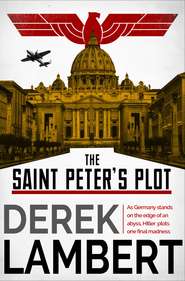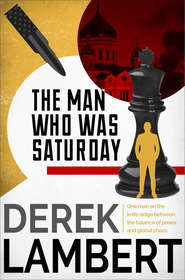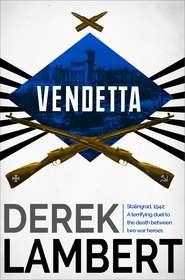По всем вопросам обращайтесь на: info@litportal.ru
(©) 2003-2024.
✖
The Yermakov Transfer
Автор
Год написания книги
2018
Настройки чтения
Размер шрифта
Высота строк
Поля
The eternal queue was shuffling into the tomb, made of slabs of polished dark-red porphyry and black granite, to pay homage to Vladimir Ilyich Lenin, the man who gave them what they had.
Gopnik was waiting beside the queue wearing a shabby overcoat and a woollen scarf. He looked very vulnerable, Pavlov thought.
He greeted Pavlov almost shyly. “I believe I was rude last night. I’m sorry – I’m not used to alcohol. As you know we don’t drink too much.”
Pavlov patted him on the shoulder. “That’s all right. You had just had a disappointment.”
They walked beside the Kremlin walls, which enclosed so much beauty and so much intrigue, until they reached the Tomb of the Unknown Soldier in Alexander Gardens. The eternal flame was pale in the cold sunshine.
Gopnik pointed at it. “I, too, fought.”
“For what?”
“I sometimes wonder,” Gopnik said.
They drove in Pavlov’s black Volga to the Exhibition of Economic Achievements. A vast park with 370 buildings, models of sputniks and space ships, industrial exhibits, shops and cafés. A few brown and yellow leaves still hung on the branches of the trees.
They toured the radio-electronics building first to give credence to their visit. Then they sat on a bench with dead leaves stirring at their feet.
Pavlov said: “You know why I wanted to see you?”
“To tell me you’re a Jew. You didn’t have to.” Gopnik paused to light a cigarette. “Don’t take any notice of what I said last night. You have more sense than me.”
“Not necessarily. But I have my reasons. But I couldn’t allow you to leave Moscow thinking I was a hypocrite.” He smiled faintly. “A Judas.” He dug his hands into the pockets of his grey Crombie. He was conscious of his clothes, the deep shine to his black shoes, the elegant cut of his trousers. He asked: “How long have you been trying to get out of Russia for?”
Gopnik opened a cardboard case and consulted several sheets of paper headed Ukranian Academy of Science. “Like most people,” he said. “Since June, 1967.”
“How many times have you tried?”
“Twenty.” Gopnik ran his finger down the list. “The Director of the Department of Internal Affairs … The Chairman of the Council of Ministers of the U.S.S.R. … the Prosecutor General of the U.S.S.R. … the Chairman of the Commission of Legal Provisions of the Council of Nationalities, Comrade Nishanov … the editor of Literaturnaya Gazata, Comrade Chakovsky.…”
He paused for breath. “You see, I’ve tried.”
“Yes,” Pavlov said, “you’ve tried.”
“My story is the same as that of any Jew with brains. You can see the Russians’ point – ‘Why give your brains to the enemy?’ “
“Why do you want to go?” Pavlov asked.
“Why? You ask why?”
“Russia’s a good country if you accept their laws, if you live as a Russian. There’s not much anti-semitism these days, only anti-Zionism. Jews are getting places at universities if they toe the line like everyone else.”
“Perhaps,” Gopnik said thoughtfully, “you’re not a Jew at all. If you were you’d understand. The persecutions of the past, the attitudes of the present – they all count. But they’re not the end-all of it. I want to go to Israel because it is my land.” He paused. “Because it is written.”
Pavlov stood up. “Then you shall go.” He began to walk towards the car scuffing the leaves with his bright toe-caps. Unconsciously, he was taking long strides, hands dug in the pockets of his coat.
Gopnik hurried beside him, scarf trailing. “What do you mean?” His voice was agitated. “I don’t want any trouble. None of us want trouble.”
Pavlov walked quicker as if deliberately trying to distress Gopnik. He spoke angrily. “You don’t want trouble? What the hell do you expect to achieve without trouble? The Jews didn’t want trouble in Germany.…”
Gopnik panted along beside him. “You don’t understand. If we cause trouble we’re lost. The pogroms would start again. Back to the Black Years. The way things are we’re winning. More and more Jews are being allowed to leave. Soon, perhaps, we’ll all go.”
“All three million?”
“They don’t all want to go. But the policy’s changing. We’re winning.…”
“Grovelling,” Pavlov snapped. “Forced to crawl for a character reference from your employer, permission from your parents – or even your divorced wife, suddenly given fourteen days to get out which is never long enough, body-searched before you leave, paying the Government thousands of roubles blackmail money. Is that victory?”
“It’s suffering,” Gopnik said. “It’s victory.”
They passed some boys playing football, a couple of lovers arm in arm. A jet chalked a white line across the blue sky above the soaring Cosmonauts Obelisk. There didn’t seem to be much oppression around this glittering day.
They reached the car. A militiaman in his blue winter overcoat was standing beside it. He pointed at the bodywork. “One rouble fine, please,” he said. “A very dirty car.”
Pavlov let out the clutch savagely and headed back towards the Kremlin. “I’ll get you out,” he said. “Don’t worry – I’ll get you to Israel.”
Gopnik said: “Please leave me alone. Let me find my own destiny.”
“By crawling?”
“Don’t you think we’ve been through enough without hot-heads destroying everything we’ve worked for?” He wound down the window to let in the cold air, breathing deeply as if he felt faint. “Who are you anyway? What do you think you can do?”
“I’m a man,” Pavlov said, “who thinks there is more to be done than writing letters to the Prime Minister of England, the President of the United States and Mrs. Golda Meir.”
“What can you do?”
The Volga swerved violently to avoid a taxi with a drunken driver.
“I can show the world,” Pavlov said, “that we have balls.”
* * *
They met mostly in the open air, on the Lenin Hills, or in the birch forests to the west of the city where Muscovites went swimming from the river-beaches in the summer and cross-country ski-ing in the long winter.
Sometimes they met in a small apartment near the junction of Sadovaya Samotetchnaya and Petrovka. While they talked about Moscow Dynamo football team, mistresses and money they systematically searched the room for microphones. De-lousing it, they called the process. So far no bugs had been found.
They only met three at a time to avoid arousing suspicion. On this evening there was Pavlov, Yury Mitin, poet and State prize winner, and Ivan Shiller, a journalist on Pravda specialising in Jewish affairs. Each had cultivated an anti-Zionist front; none had Jew on his passport.
Each was fierce in his belief, none more so than Shiller, his anger fomented by the daily betrayals he had to perpetrate in his newspaper. Yesterday he had finished rounding up fifty prominent Jews and ordering them to sign a letter condemning Israeli aggression in the Middle East.
The letter also referred to emigration. “We were born and bred in the Soviet Union. It is here that our ancestors of many centuries lived and died. There is no reason why we should go to Israel. And, anyway, how is it possible to ‘return’ to a place where one has never been?”
“And do you know” – Shiller spoke with bitter contempt – “that some of them were quite happy to sign?”
Shiller was second-in-command of the Zealots who took their name from the 960 Jewish martyrs who killed themselves rather than surrender the citadel of Masada to the Romans. Death before dishonour. The Masada Complex symbolised the spirit of Israel: it symbolised the spirit of Russia’s small band of Zealots.
To avoid detection they used code-names each having a trade beginning with the letter P in the English language. Pavlov was the Professional, Mitin the Poet, Shiller the Penman.
Другие электронные книги автора Derek Lambert
The Red Dove




 3.67
3.67
Vendetta




 0
0











